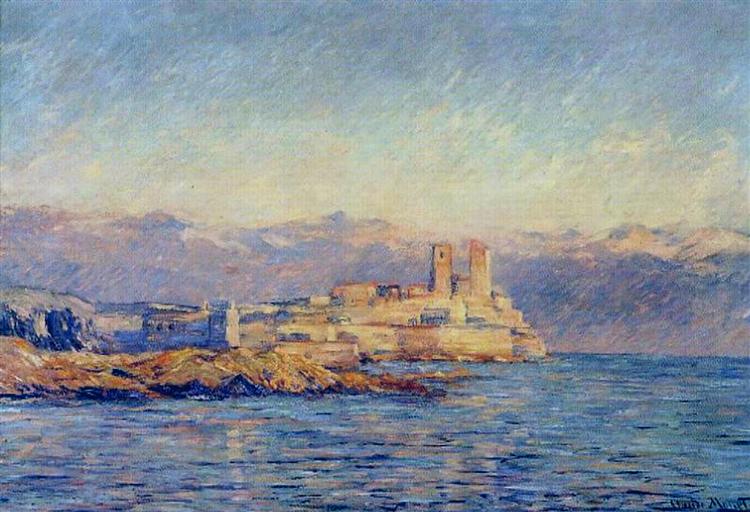Beschrijving
In 1888, Claude Monet executed one of his masterpieces that captures not only the essence of the Antibes landscape, but also the sensitivity and innovative style of the Impressionist movement. “The Château de Antibes” is presented as an enchanting study of light and color, where the iconic castle stands among a sea of vibrant hues and rich textures, evoking the beauty of the French Riviera. The work invites us to immerse ourselves in the atmosphere of the place, using color and light to convey a sense of place and time, characteristics that defined Monet’s artistic career.
The overall composition of the painting reveals a careful balance between the castle, the sky and the sea. In the foreground, the stones of the castle, with their warm, terracotta tones, contrast with the freshness of the blue of the sea and the green of the surrounding vegetation. Monet employs a loose, energetic brushstroke technique, typical of his style, which allows the colours to merge with each other, suggesting movement and life in the environment. This technique not only provides a fleeting impression of the moment captured, but also establishes an emotional connection with the viewer, giving them the feeling of being present at that site.
The skies, painted in a palette of soft blues that blend with the white of the clouds, create a luminescent atmosphere. The effectiveness of the light in "The Castle of Antibes" is noteworthy; Monet uses natural light to his advantage, reflecting how it changes and brings life to the landscape. This use of light is of great importance, as it is a central element in the Impressionist vision, where the focus is on the momentary impression rather than on photographic precision.
It is interesting to note that while there are no prominent human figures within the work, the presence of the castle and its relationship to the surroundings hints at a sense of history and humanity. The castle itself becomes a symbol of local history, evoking tales of bygone eras. Monet seems to invite the viewer to meditate on the intersection between nature and human construction, a recurring theme in his work.
Completing this work, Monet uses a range of greens that create a sense of depth and texture in the vegetation, reinforcing the feeling that the surroundings are as vital and present as the castle itself. This allows the viewer to feel an immersion in both the landscape and the tranquil atmosphere of the place.
"The Castle of Antibes" follows on from Monet's exploration of light and colour that can be found in similar works such as "Monet's Garden at Giverny" or "The Cathedral of Rouen". All of these works share the same ethos of emotional and sensitive capture, where each brushstroke seems to be imbued with the liveliness and immediacy of the moment.
In conclusion, “The Castle of Antibes” is not only a representation of a specific place, but also an exploration of the Impressionist style as a whole. Monet’s ability to fuse light, color, and form into a visual symphony continues to resonate in contemporary art history, reminding us of the ephemeral beauty found in the world around us. Every glance at this work invites us to discover new nuances and subtleties, making this painting an artistic gem worthy of study and admiration.
KUADROS ©, a famous painting on your wall.
Hand-made oil painting reproductions, with the quality of professional artists and the distinctive seal of KUADROS ©.
Painting reproduction service with satisfaction guarantee. If you are not completely satisfied with the replica of your painting, we will refund 100% of your money.

